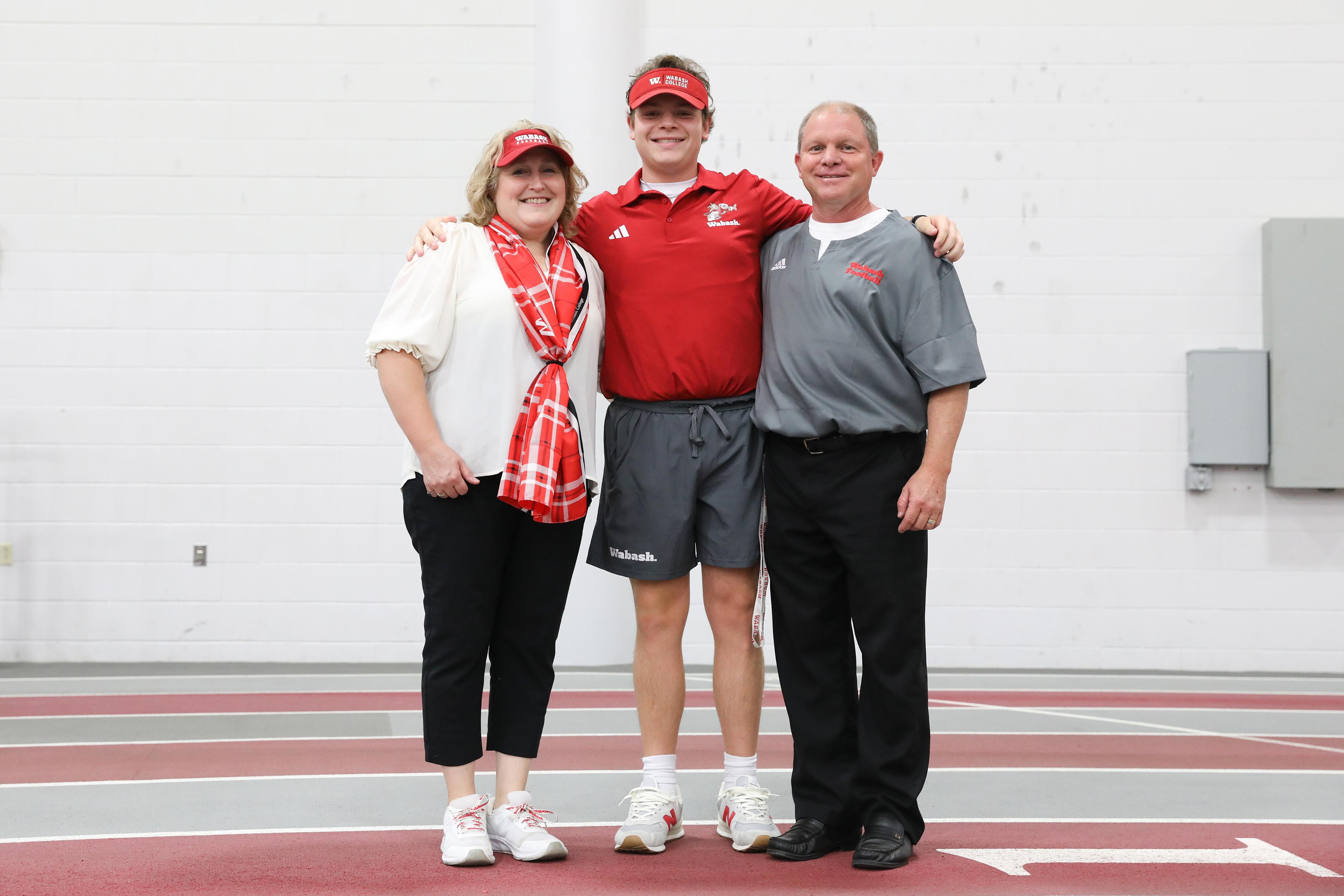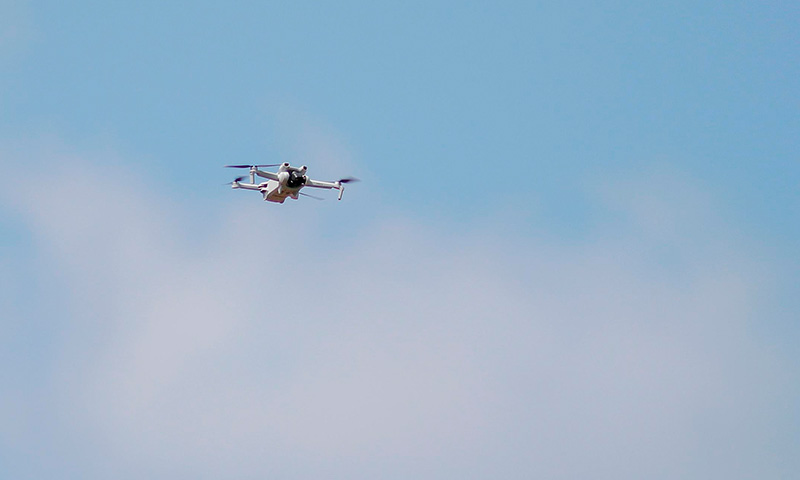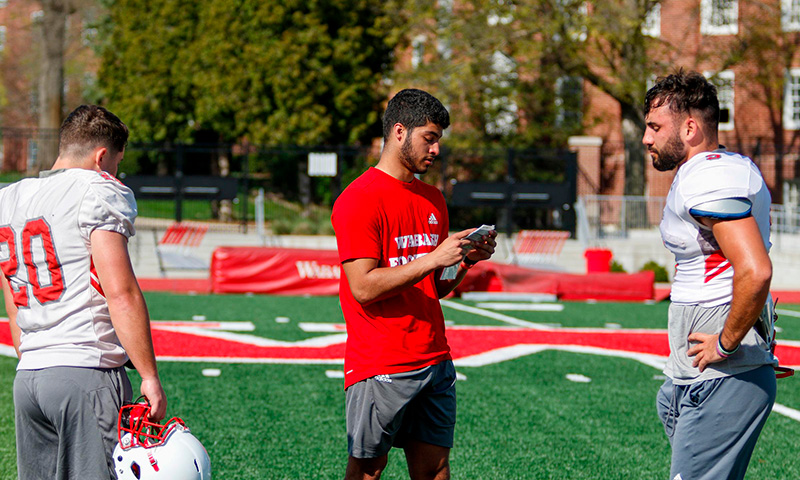The summer before Alex Kindig ’26 started at Wabash, he left a voicemail for then-Head Football Coach Don Morel. He wasn’t calling to join the team as a player. He wanted to help as a student assistant.
One 20-minute call later, he had the job.
When Kindig walked into the armory on the first day of fall training camp, Assistant Coach Olmy Olmstead ’04 immediately recognized his name.

“Coach Olmstead said, ‘I heard your voicemail, we all did. As soon as Coach Morel got your message, he called all the coaches together to hear a message from an incoming freshman who doesn’t want to play, just wants to be part of our program,’” Kindig recalled.
From that first day, Kindig says he felt welcomed and valued. “I've always wanted to contribute, and they are always appreciative of my contributions,” he said. "I'm really glad that our program is what it is, and that I'm part of it.”
Olmstead, who played for the Little Giants before returning to join the coaching staff, says the behind-the-scenes work of student assistants like Kindig is essential.
“A lot of the work is done by our student assistants in advance of games,” Olmstead said. “As soon as game A is over, we spend a couple hours making corrections, then immediately begin preparations for game B. None of that would be possible without them.”
 Kindig started as the helmet and sideline technician, drawing on his experience of helping with equipment at his high school in Brooke, Indiana.
Kindig started as the helmet and sideline technician, drawing on his experience of helping with equipment at his high school in Brooke, Indiana.
Later, he moved to filming practices, scrimmages, and games—recording, editing, and distributing the footage to position coaches for analysis throughout the week. He also operates Wabash’s in-game play review, selecting clips to be sent to the iPads used in the coaches’ box and on the sidelines to provide the coaching staff with immediate visibility of the previous play for real-time analysis.
His roommate, student assistant coach Justin Browder ’26, has taken a different path to a similar role. A former running back recruit from Avon High School, Browder’s playing career was cut short by a series of knee injuries. Instead of walking away from the sport, he found a new way to make an impact.
He started as a signaler on the sidelines while recovering from an injury his freshman year. He then coached the running back position. This year he is an assistant offensive line coach on the field. He also makes an impact behind the scenes—data input, film breakdown, and analyzing opponents so coaches can evaluate their plan of attack.

“I've been around football my whole life and I knew it was something that I wanted to step into,” said Browder. “In a way, that torn ACL and meniscus fast-tracked my football coaching career. It's been a huge blessing because I've figured out that I don't actually want to coach forever, but I do want to be in the front office of a football setting. I learned that all in three and a half years.”
While Browder once imagined a future on the sidelines, he discovered a passion for football operations at Wabash.
“It’s all of the background stuff that allows the players to play and the coaches to coach,” he said. “It’s the stuff they likely don’t notice, and that’s the goal.”
Browder now manages team travel, meals, and other behind-the-scenes operations that keep the program running smoothly. Olmstead credits him for turning complex weekends on the road into well-oiled process.
“On Friday nights we gather for dinner and then immediately depart for the hotel,” Olmstead said. “Justin will have already been there, collected all the keys, and separated them by position group. We can get a travel party of 100 or more people in the front door of the hotel and into their rooms in about three or four minutes. It’s remarkable.”
This summer Browder took his skills to the professional level as a football operations intern with the Tennessee Titans. His responsibilities mirrored his work at Wabash, just on a larger scale. Instead of coordinating bus trips, he helped plan and execute flight manifests and traveled with the team to Tampa, Florida, and Atlanta, Georgia.
Now as their senior seasons draw to a close, both Kindig and Browder highly anticipate one last highlight: the Monon Bell Classic against the Depauw University Tigers.
“I remember my sophomore year, the first Bell game that I had experienced at home,” Browder said. “It was the loudest I had ever heard this place. I get goosebumps just thinking about that atmosphere, so I'm excited to see Little Giant Stadium packed again for my senior year.”
Kindig agreed. “It’s almost prophetic, playing at home this year,” he said. “I wouldn't want to end my career anywhere else.”